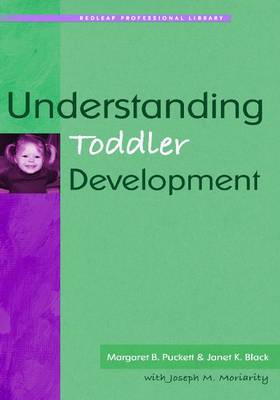Understanding Development
3 total works
Understanding Preschooler Development
by Margaret B Puckett, Janet K. Black, and Joseph M. Moriarity
Published 23 May 2007
By the beginning of his fourth year, a child is much stronger, better coordinated, and adept at communication than he was two years before. He will make another huge developmental leap as a preschooler. You can help promote this growth, especially if you understand the basics of preschoolers' development presented in this book.
In the book's first part, readers will learn about preschoolers' motor skill development and ways to foster it through movement, manipulation, and interaction with others. Parts two and three discuss preschoolers' psychosocial and intellectual development, and their rapid growth in language and literacy.
Understanding Preschooler Development is one of a series of three practical, easy-to-read child development handbooks adapted from The Young Child, a textbook used in academic programs nationwide. Each book focuses on a specific age group. Written for child care providers in any setting, the set provides a complete overview of key theories and research on child development.
Understanding Preschooler Development explains:
In the book's first part, readers will learn about preschoolers' motor skill development and ways to foster it through movement, manipulation, and interaction with others. Parts two and three discuss preschoolers' psychosocial and intellectual development, and their rapid growth in language and literacy.
Understanding Preschooler Development is one of a series of three practical, easy-to-read child development handbooks adapted from The Young Child, a textbook used in academic programs nationwide. Each book focuses on a specific age group. Written for child care providers in any setting, the set provides a complete overview of key theories and research on child development.
Understanding Preschooler Development explains:
- The impact and long-term effects of biology and environment on early brain development in pre-schoolers.
- How preschoolers learn.
- Important theories of child development in preschoolers.
- How early life experiences lay the groundwork for preschoolers' developing language acquisition and thinking.
- The effects of nurturing care on preschoolers' emotional development and stability in later life.
- Milestones and windows of opportunity for preschoolers' development.
Understanding Toddler Development
by Margaret B Puckett, Janet K. Black, and Joseph M. Moriarity
Published 23 May 2007
During children's toddler years-ages one to three-they are exploring the world, both physically and intellectually. In that short time, important milestones for increased mobility, language acquisition, and social skills present new challenges in early care and education settings. Caregivers can have a positive role in promoting this growth, especially if they understand the basics of child development presented in this book.
Understanding Toddler Development details the impact toddlers' experiences and routines, including how much sleep they get, can have on brain growth and emotional stability. It also gives important strategies for helping toddlers avoid the accidents to which they are so prone.
Understanding Toddler Development is part of a series of child development handbooks written by Margaret B. Puckett, Janet K. Black, and Joseph Moriarity: Understanding Infant Development, Understanding Toddler Development, and Understanding Preschooler Development.
All are adapted from The Young Child. Written for child care providers in any setting, the series providess a comprehensive overview of key theories and research on child development.
The chapters in Understanding Toddler Development cover topics including:
Understanding Toddler Development details the impact toddlers' experiences and routines, including how much sleep they get, can have on brain growth and emotional stability. It also gives important strategies for helping toddlers avoid the accidents to which they are so prone.
Understanding Toddler Development is part of a series of child development handbooks written by Margaret B. Puckett, Janet K. Black, and Joseph Moriarity: Understanding Infant Development, Understanding Toddler Development, and Understanding Preschooler Development.
All are adapted from The Young Child. Written for child care providers in any setting, the series providess a comprehensive overview of key theories and research on child development.
The chapters in Understanding Toddler Development cover topics including:
- The impact and long-term effects of biology and environment on toddlers' early early brain development.
- How toddlers learn.
- Important theories of toddler child development.
- How early life experiences lay the groundwork for toddlers' evolving language acquisition and thinking.
- The effects of nurturing care on toddlers' emotional development and stability in later life.
- Milestones and windows of opportunity for toddlers' development.
A child's first year is one of remarkable growth. For example, in that short time, she learns to crawl, to take pride in herself, and to say simple words. You can have help promote this growth-especially if you understand the basics of child development presented in this book.
Understanding Infant Development is one in a series of three practical, easy-to-read child development handbooks adapted from The Young Child. Each book focuses on a specific age group. Written for child care providers in any setting, the set provides a complete overview of key theories and research on child development.
Understanding Infant Development explains:
The impact and long-term effects of biology and environment on an infant's brain development.How infants learn.Important theories of infant development.How early experiences lay the groundwork for an infant's development in language and thinking.The effects of nurturing on an infant's emotional development and stability in later life.Milestones and windows of opportunity in an infant's development.
Understanding Infant Development is one in a series of three practical, easy-to-read child development handbooks adapted from The Young Child. Each book focuses on a specific age group. Written for child care providers in any setting, the set provides a complete overview of key theories and research on child development.
Understanding Infant Development explains:
The impact and long-term effects of biology and environment on an infant's brain development.How infants learn.Important theories of infant development.How early experiences lay the groundwork for an infant's development in language and thinking.The effects of nurturing on an infant's emotional development and stability in later life.Milestones and windows of opportunity in an infant's development.


